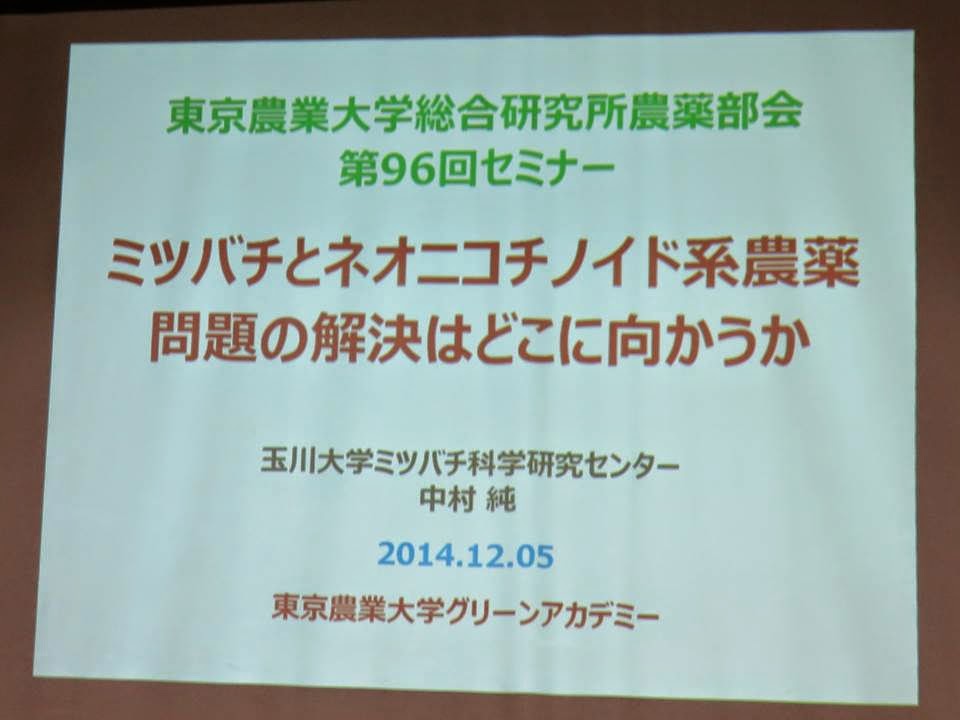今後非会員が参加を希望した場合は会場の座席数に余裕があれば、非会員の個人参加として参加費3000円を払ってもらって参加を認めるということを確認しました。メディア(報道関係者)が取材のために参加を希望した場合は、今後は参加費無料で参加を認めるということも確認しました。
メールの参加申し込み者は約50人で、葉書その他での参加申込者を含めて約60名の参加者を予測していましたが、実際には80名を超える参加者がありましたので、折り畳み式の椅子を20個ぐらい壁際に並べて座席数を増やして対応しました。
「ミツバチとネオニコチノイド系農薬~問題の解決はどこに向かうか~」と題した中村 純先生の講演は、内容構成も非常によく練られていて、話術の巧みさもあって、参加者はひきこまれました。ミツバチは世界的には減っているのではなく増え続けていて、アメリカでも日本でもネオニコチノイドが導入されてからの減少は見られないということ、ミツバチがいなくなるような現象はネオニコチノイドとは無関係にずっと昔から起こっていたということ、現在ミツバチを苦しめている要因は何かなどについて、説得力のあるお話をされました。
「ネオニコチノイドの選択性:メカニズムとレベル」と題した松田一彦先生の講演は、nAChR(ニコチン性アセチルコリン受容体)の分子構造を基にネオニコチノイドによる阻害反応の選択性について説明をされました。実験手法も含めてこういう分野に馴染みのない参加者にとっては理解するのが難しかったと思います。ニコチノイドは脊椎動物のnAChRに対して、ネオニコチノイドは昆虫のnAChRに対して活性が高いという選択性があり得ることを示されました。
「ネオニコチノイドの評価~EFSAは何をどう評価したのか」と題した畝山智香子先生の講演は、一般にEUはネオニコチノイドを2年間禁止したと言いふらされていることの内容を特にイミダクロプリドとアセタミプリドについて具体的に解説し、Kimura-Kuroda論文に対してEFSAがどこが問題として指摘し、何故この論文は何も明らかにしていないという低い評価をしたか具体的に説明されました。
グリーンピース・ジャパンから参加された3名の方々は熱心にメモをとりながら聴講していました。参加された3人の方々のバックグランド(理系か文系か)は存じませんが、それぞれの分野の第一人者の研究者によるこういう科学的な講演を直接聴くことができて、恐らく「目からうろこ」の印象を受けたのではと想像します。食と農業担当のSさんとは会場で名刺交換し言葉も交わしましたので、質疑応答の時間に、農薬支持の参加者ばかりの会場で遠慮されてはいけないと思って何か質問やご意見はありますかと訊いて発言の機会を提供しました。どの講演者も政治的な発言ではなく、科学的な事実だけを話したということもあって、グリーンピース・ジャパンの先日の新聞広告にあったような政治的な発言は不適切との雰囲気を感じられたのか、畝山先生の講演の中ででてきた基準値を決める場合の安全係数(不確実性)の根拠についてだけ質問をされていました。
懇親会にも多くの参加者が参加されて、交流を深めていましたが、残念ながらグリーンピース・ジャパンからの3人には参加していただけませんでした。懇親会の乾杯の音頭はいつものように山本 出先生にお願いしましたが、中締めは猪飼(いかい)隆氏(元日産化学社長、元農薬工業会会長)にお願いしました。猪飼氏のコメントに、今回のセミナーには若手の参加者が多く活気があったという評価をいただき、講師が素晴らしく講演内容が素晴らしかったからですが、企画に関わり座長をした私も褒(ほ)められたような気がして嬉しく思いました。
山本先生のお宅での二次会が終わって自宅に着いたのは夜の11時近くになりました。
会場である人から、イギリスの新聞THE TIMESに面白い記事が載っているという情報をもらいましたので、ネットで検索したら次のサイトが見つかりました。
他にもこの問題を論じたサイトがありましたが、肝心の2014年12月4日付けの「ザ タイムズ」の記事を以下にコピーしておきます。見出しは Scientists accused of plotting to get pesticides banned (農薬を禁止に追い込む目的で策略を立てて研究をしたとして科学者が非難された)となっていました。4人の科学者が2010年6月14日にスイスに集まり、行政を動かしてネオニコチノイドを規制させるために、著名な研究者に2編の論文を発表させる策略を立てて実行したことが私的ノートで明らかになったというものです。科学の研究は客観的な事実を明らかにするために行われるものなのに、主観的な政治的な目的を達成する目的で研究を行って論文を発表した、ということが問題にされています。
ネオニコチノイドについては、日本でもネオニコチノイドを禁止に追い込もうという活動をしている活動家グループが活動の根拠としてよく引用する2報の論文が最近発表され、その両方とも信頼性や内容に深刻な疑問が呈されています。まさか同様のことが行われたようなことはないと思いますが・・。
THE TIMES 04.12.2014
Ben Webster
Environment Editor
Scientists accused
of plotting to get pesticides banned
Research blaming pesticides for the decline
in honeybees has been called into question by a leaked note suggesting that
scientists had decided in advance to seek evidence supporting a ban on the
chemicals.
The
private note records a discussion in 2010 between four scientists about how to
persuade regulators to ban neonicotinoid insecticides.
The
EU imposed a temporary ban last year after the European Food Safety Authority
identified risks to bees. The Department
of Environment, Food and Rural Affairs opposed the ban, saying that there was
not enough evidence of harm to bees.
Many farmers have blamed the ban for high
levels of damage to this winter’s oilseed rape crop from flea beetle.
The
leaked note says that the scientists agreed to select authors to produce four
papers and co-ordinate their publication to “obtain the necessary policy
change, to have these pesticides banned”.
A
paper by a “carefully selected first author” would set out the impact of the
pesticides on insects and birds “as convincingly as possible”. A second “policy forum” paper would draw on
the first to call for a ban.
The
note, which records that the meeting took place in Switzerland on June 14,
2010, says: “If we are successful in getting these two papers published, there
will be enormous impact, and a campaign led by WWF etc. It will be much harder for politicians to
ignore a research paper and a policy forum paper in [a major scientific
journal].”
The
scientists at the meeting included Maarten Bijleveld van Lexmond, chairman of
the Task Force on Systemic Pesticides, and Piet Wilt, chairman of the
ecosystems management commission of the International Union for Conservation of
Nature, an influential network of scientists and environmental groups.
The
task force, a group of scientists who advise the IUCN, published a report in
June stating that neonicotinoids were “causing significant damage to a wide
range of beneficial invertebrate species and are a factor in the decline of
bees”.
The
task force used the report to call on regulators to “start planning for a
global phase-out” of neonicotinoids. The
present two two-year EU ban, which began last December, is due to reviewed next
year using evidence from field trials.
Thousands
of farmers who use neonicotinoids are hoping that the trials, overseen by the
Centre for Ecology and Hydrology, will show that the rsks to bees have been
overstated.
Nick
von Westenholz, chief executive of the Crop Protection Association, which
represents Bayer and Syngenta, manufacturers of neonicotinoids, said: “The work
of the task force is regularly cited by activists as being strongly independent
research, conducted with the utmost scientific rigour.
“From
reading this document, it looks to me that this group decided on its
conclusions first and then embarked on the research to back them up. That clearly flies in the face of claims that
the IUCN study represents independent and rigorous science. The claims of the task force now seem
increasingly suspect and I hope that policymakers will treat these studies with
an appropriate degree of caution”.
Mr
Wilt said that the leaked note was accurate but he denied that the scientists
had decided the conclusions of the research in advance. Dr Bijleveld van Lexmond, a founding member
of WWF in the Netherlands, said that the task force was independent and unbiased.
